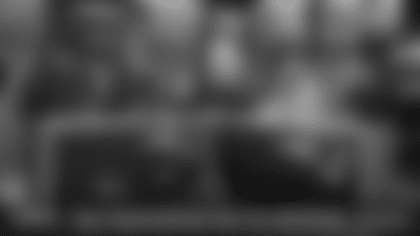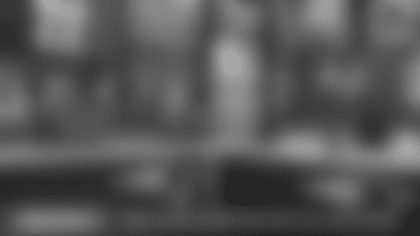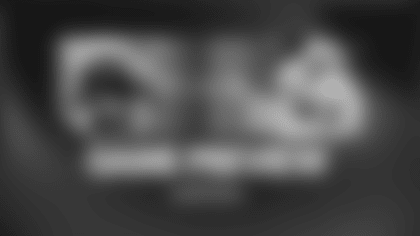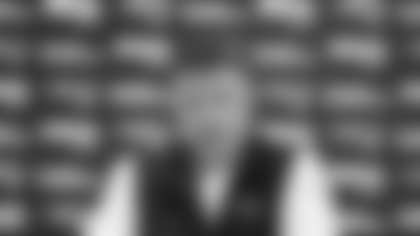BB: Alright, so, another big week for us here. Kind of switching into - we're not out of training camp, but switching into a little bit more of a regular season-type routine. Getting ready for Detroit and what we have to do to get ready for Detroit. Good opportunity to work on that and move ahead. Obviously, there's a lot of things we need to work on based on the first two preseason games, but we need to transition into sort of a regular season schedule. Not there yet, but it's one step.
Q: Will you treat this game as more of a regular season game with game planning, learning more about the Lions' personnel and giving the players a feel for that?
BB: Yeah, I think a little more of that on the Lions. I don't think necessarily on our end of what quadruple reverse can we run, but just scouting report, game plan, film, situational awareness, individual cutup films, things like that.
Q: In years past, have you seen guys that are fighting for those roster spots respond differently to this shift when you move into more of a regular season schedule?
BB: I don't know. I mean, every day's an important day for us. I don't think there's any switch that flips. There's just different stages that we go through. Hopefully we've been working hard all the time.
Q: How important is it for players on the roster bubble to get an extra look now that there is only one roster cut down?
BB: Yeah, every day's important. Every opportunity is important. Hopefully everybody's taking advantage of all of them, no matter what their situation is - you know, for roster spots, for playing time, for preparation for the season. I mean, it's all important to me.
Q: Does having only one roster cut change your approach in terms of how you will do homework on the hundreds of players that will soon be available?
BB: Well, I mean, it's not that much different than what it was before. I mean, a lot of the guys that went at the 75 cut - I mean, the better players came from 75 to 53 than from 90 to 75. I don't think it's that big of a deal.
Q: When you're evaluating guys who are in their second year with the program, at what point can you tell that a player might be poised to take a second-year jump?
BB: Yeah, I don't know that there's any set time frame. It could be in training camp. It could be in the regular season. It could be halfway through the year. It could be a combination of those because guys get asked to do a lot of things, so something might come together a little quicker than something else does. Run defense might come a little faster than pass rush or vice versa. Route running might come faster than blitz pickup. I don't know.
Q: When it comes to guys on the end of the defensive line, how important is discipline?
BB: It's important at every position - end of the line, middle of the line, off the line. It's consistency and discipline. Yeah, I mean, the guy at the end of the line's got an important job to do. So does the next guy, so does the next guy, so does the guy behind him. So, the guys on the line of scrimmage, consistency's always a little more important for them because the guys behind them have to react to the guys that are on the line. So, if you know where the guys that are on the line are, whether it be offensive or defensive linemen, then it's easier for the next level to fit in. When they're not there, then that makes it hard. It's hard to know where to go if things aren't where they're supposed to be. So, then you're kind of waiting to see where they are and then figure out where you go instead of just going to where you're supposed to be.
Q: Have you noticed that players making the transition from the college game to the pro game have difficulty in acquiring the discipline that they need at this level, or do they come in here with a pretty good understanding of what they need to do in that regard?
BB: I mean, there's a lot of those plays in college. There's a lot of key option plays, whatever you want to call them, so there's a lot of that element. I'd say, in this league, there's just a lot more speed. So, you might have leverage against the certain player. But, in this league, you've got a higher-caliber player, [and] that leverage isn't enough anymore. You know, a lot of times those guys are out of position, but they're just athletic and fast enough to make it up because, I mean, look, they're playing in this league so they have some pretty good skill. Now the guys that they're playing against have just as much skill and a lot more experience than they do. So, they're kind of on the tail end of it instead of on the front end of it.
Q: How much did Adam Butler play outside in college and what do you need to see from an interior player to decide if he can also play well on the end?
BB: Well, Adam hadn't really played all the way across the front at Vanderbilt. They had a rotational system, and when certain players were in there, he played in. When other players were in there, he played on the nose or on the 2-technique. So, he was sort of the more versatile player. Depending on who else was in there, then his position adjusted in part of the rotation. So, we've seen him play across the board and we've used him in different spots, too. It's definitely an advantage for him if he can do that.
Q: When a player doesn't have a ton of experience at a certain position, can you mold that player a little bit more? Have you found that there are not as many mistakes he's learned that you have to correct?
BB: Yeah, possibly - don't have a lot of bad habits. They can just build good ones, but the lack of experience is the flip side of that. But, some players gain that experience quickly. Some don't. So, it could go both ways on that, but sure. I mean, rookies in general, there's a little bit more - in some cases, they're more moldable than a guy that's played in the league eight years that's already doing things a certain way that's gotten him to that point. It's kind of hard to change, and sometimes it's not worth changing, that they can just keep doing what they're doing and it still works with the responsibilities that you give them.
Q: What have you seen from Geneo Grissom in terms of his development and versatility?
BB: Well, that's something that Geneo's worked really hard on this year in the spring and in training camp. We've used him inside as a rusher, used him outside. He's got some versatility. He can fill in at some different spots for us depending on where we need him, even some linebacker responsibilities. So, he definitely understands how valuable that is to our team and our defense to be able to combine those defensive roles with the kicking game and multiple roles on defense. He's worked hard at that, and I think he made a jump this year, just really understanding, now that he solidified his special teams role last year, understanding how he can move to the next step defensively. And Joe [Judge] and Bubba [Ray Ventrone] have both done a good job on that, as well, kind of in practice and meetings and so forth being able to allocate the time so he can be most efficient with the multiple responsibilities that are part of his job, part of his role.
Q: How much can you judge from these past games without having done any game planning against your opponents?
BB: Well, they're not game planning either. I mean, it's not like Houston's game planning or Jacksonville.
Q: But, what kind of stock do you put into what you see in these games?
BB: Well, a lot of stock. You're able to evaluate your basic fundamentals against another team's basic fundamentals. So, it's not an X-and-O game. It's just a basic fundamental game. There's a lot to be said for that. I mean, that's the foundation of every play is good fundamentals. So, we win some, they win some, but along the way, even if you're losing on a fundamental matchup on a particular play, hopefully you're improving, you're gaining experience and you're correcting mistakes and moving forward on it for the next player and the next game, that type of thing. I think it's very important, but obviously, it takes out a lot of the scheme part of the game. But, the fundamental part of the game, in the end, is more important than the scheme part of the game. So, without good fundamentals, the scheme play is - I mean, they're no good.
Q: When you talk about the moldability of rookies, how has Harvey Langi grown since he's been here, and how important has it been for him to see a high number of snaps in these preseason games?
BB: Yeah, well, he's learned a lot. He has a lot to learn. He played off the ball and on the ball and played in the kicking game in college. He's done all those things here. He's been more on the ball than off the ball in this camp but more off the ball than on the ball in the spring. We'll see where we end up on that, and he's done multiple things in the kicking game, as well. So, he has some background in it but in a different system and so forth. So, some experience, but we need to refine some things for the way we do it. But, he's got a lot on his plate. He's asked to do a lot, so smart guy, he works hard and we'll see how it comes together.
Q: Is Langi a player that you were surprised was still out there after the draft?
BB: You know, it's hard to tell. I mean, we didn't pick in those later rounds, so we picked in the fifth, right? No sixth, no seventh, so at that point, you're just sitting there kind of watching the parade go by and then when it's over, move in. So, that was - I don't know.
Q: What strides have you seen Devin Lucien take after spending a year here?
BB: Well, Devin had a really good offseason, worked hard, physically in good shape. He's a tough kid and knows a lot more about our offense and our adjustments. We used him some in multiple positions. Last year, he was just more at one spot. We've moved him around a little bit more, so his knowledge and experience in our system has helped him. He's put in a lot of hard work, so he's improved in all the areas - physically, understanding the playbook, adjustments, techniques. He's made progress.
Q: With a month of practice under his belt, has David Harris fit into the team the way you expected him to?
BB: Yeah, David's, again, a real experienced player with a lot of - he's a smart football player. So, he's picked things up pretty quickly. Again, we've worked a lot of different combinations at linebacker and at defensive line and the secondary, so there's been quite a few moving parts. At some point, that's all going to settle down, but I'd say that there's a new element of that with a new player just getting to know your teammates, just getting to know which guy - you know, maybe you can tell him something right before the snap and he gets it. The other guy maybe needs a little more time to process it. Or, one guy likes to go in and out, the other guy likes to lock the coverage - you know, that kind of thing. So, I'd say there's a lot of little things that he's picking up experience wise that aren't like major, major playbook issues, but they're little personality things or you hear a call and maybe it's not one of the calls in the playbook, but it's one of the calls that guys use between each other to identify something and kind of, 'What was that?' and that type of thing. But, yeah, I think he's adapted. You know, he's been very diligent in doing everything we've asked him to do and understands the defense and can run the defense. But, I think still playing regularly, consistently with the same players, or not the exact same players but a certain rotation of players, that that will help everybody when we get to that. But, we have to figure out who that is first. So, we've had a lot of competition on the defensive line. Defensive tackle is an area where we have a number of guys that have done well. And a guy like [Alan] Branch, who just came back last week, so working him into that. Defensive end, we've had some moving parts there, as well, and at linebacker, too. So, that's part of it, as well as just learning the plays, learning the people.
Q: What is Brandon Bolden's value in both the special teams and running back rooms?
BB: Brandon's played for us on all three downs. He's played on the early downs. He's played in sub situations. He's a smart player and has a good set of skills. I mean, he can run, he can catch, he can pass protect, and he's given us a lot of production and leadership in the kicking game. So he does a good job in the room with it being the running back room or in the special teams room of being prepared, helping out the younger guys. He's a good communicator, so things on the punt team, punt return where things can happen pretty fast and you need to make some adjustments, he's good at that, very good in blitz pickup and his understanding of the passing game. So, he's a four-down player, three-down offensive player with versatility in the kicking game and all the different phases.
Q: From the outside and what we've already seen in preseason, it looks like you have a very deep, talented group of running backs. Do you see it the same way?
BB: Yeah, I think there's good competition there, absolutely. I think there's really good competition. They're all a little bit different. They're not really apples-to-apples where these two guys do the same thing, which one is better? One guy might be a little better at one thing. Another guy is better in a little something else. Another guy plays in the kicking game. Another guy is a little more size. Another guy is a little faster. So, I mean, they come in different packages. They've been productive. You know, LeShun [Daniels, Jr.] has had the least opportunity, and then he would have had more last week but wasn't able to play against Houston. So, we'll see how that goes, but the guys that have had an opportunity have done well.
Q: On a lighthearted note, are you an eclipse guy? Does this interest you at all?
BB: Yeah, I mean, it's great.










































